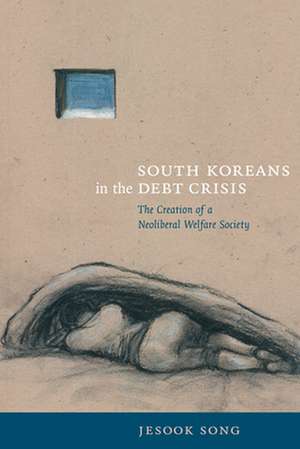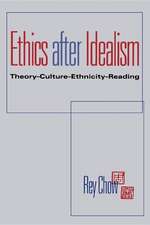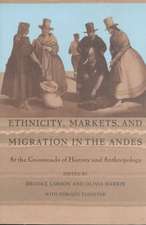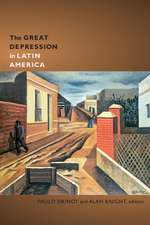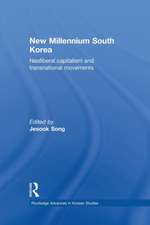South Koreans in the Debt Crisis – The Creation of a Neoliberal Welfare Society: Asia-Pacific: Culture, Politics, and Society
Autor Jesook Songen Limba Engleză Paperback – 17 aug 2009
Din seria Asia-Pacific: Culture, Politics, and Society
-
 Preț: 158.97 lei
Preț: 158.97 lei -
 Preț: 215.87 lei
Preț: 215.87 lei -
 Preț: 215.33 lei
Preț: 215.33 lei -
 Preț: 152.37 lei
Preț: 152.37 lei -
 Preț: 262.91 lei
Preț: 262.91 lei -
 Preț: 306.99 lei
Preț: 306.99 lei -
 Preț: 262.54 lei
Preț: 262.54 lei -
 Preț: 305.08 lei
Preț: 305.08 lei -
 Preț: 221.81 lei
Preț: 221.81 lei -
 Preț: 309.87 lei
Preț: 309.87 lei -
 Preț: 194.42 lei
Preț: 194.42 lei -
 Preț: 260.41 lei
Preț: 260.41 lei -
 Preț: 357.26 lei
Preț: 357.26 lei -
 Preț: 262.32 lei
Preț: 262.32 lei -
 Preț: 262.32 lei
Preț: 262.32 lei -
 Preț: 261.93 lei
Preț: 261.93 lei -
 Preț: 239.49 lei
Preț: 239.49 lei -
 Preț: 267.32 lei
Preț: 267.32 lei -
 Preț: 266.77 lei
Preț: 266.77 lei -
 Preț: 221.22 lei
Preț: 221.22 lei -
 Preț: 265.20 lei
Preț: 265.20 lei -
 Preț: 262.32 lei
Preț: 262.32 lei -
 Preț: 265.41 lei
Preț: 265.41 lei -
 Preț: 306.99 lei
Preț: 306.99 lei -
 Preț: 265.20 lei
Preț: 265.20 lei -
 Preț: 230.53 lei
Preț: 230.53 lei -
 Preț: 267.92 lei
Preț: 267.92 lei -
 Preț: 306.99 lei
Preț: 306.99 lei -
 Preț: 263.47 lei
Preț: 263.47 lei -
 Preț: 306.00 lei
Preț: 306.00 lei - 9%
 Preț: 668.31 lei
Preț: 668.31 lei - 9%
 Preț: 666.26 lei
Preț: 666.26 lei -
 Preț: 269.20 lei
Preț: 269.20 lei -
 Preț: 246.08 lei
Preț: 246.08 lei - 9%
 Preț: 668.57 lei
Preț: 668.57 lei
Preț: 237.47 lei
Nou
Puncte Express: 356
Preț estimativ în valută:
45.44€ • 47.61$ • 37.56£
45.44€ • 47.61$ • 37.56£
Carte tipărită la comandă
Livrare economică 11-25 aprilie
Preluare comenzi: 021 569.72.76
Specificații
ISBN-13: 9780822344810
ISBN-10: 0822344815
Pagini: 232
Ilustrații: 9 photographs
Dimensiuni: 156 x 235 x 15 mm
Greutate: 0.32 kg
Ediția:New.
Editura: MD – Duke University Press
Seria Asia-Pacific: Culture, Politics, and Society
Locul publicării:United States
ISBN-10: 0822344815
Pagini: 232
Ilustrații: 9 photographs
Dimensiuni: 156 x 235 x 15 mm
Greutate: 0.32 kg
Ediția:New.
Editura: MD – Duke University Press
Seria Asia-Pacific: Culture, Politics, and Society
Locul publicării:United States
Cuprins
Contents; Preface; AcknowledgmentsIntroduction: The Emergence of the Neoliberal Welfare State in South Korea; 1. The Seoul Train Station Square and the House of Freedom; 2. Family Breakdown and Invisible Homeless Women; 3. Assumptions and Images of Homeless Womens Needs; 4. Youth as Neoliberal Subjects of Welfare and Labor; 5. The Dilemma of Progressive IntellectualsCoda: The Pursuit of Well-Being Notes; Glossary; Bibliography
Recenzii
South Koreans in the Debt Crisis is a very powerful analysis of the specific forms that neoliberalism has taken in a late-industrializing East Asian society, not just in the governments actions but in individuals and activist-intellectuals self-conceptions. There is very little that explores in such depth how neoliberal logics work in East Asian countries where well established liberal societies did not exist prior to neoliberal reform. Ann Anagnost, author of National Past-Times: Narrative, Representation, and Power in Modern ChinaThis is the first book in English on a very important topic: how South Korea became a neoliberal state during the period when the IMF crisis affected the whole society. Not only the government but also the mass media and progressive intellectuals were involved in the construction of the categories of deserving and undeserving welfare recipients. In this book, Jesook Song shows how neoliberalism as a governing technology works in everyday life.Seung-kyung Kim, author of Class Struggle or Family Struggle? The Lives of Women Factory Workers in South Korea
Notă biografică
Textul de pe ultima copertă
"This is the first book in English on a very important topic: how South Korea became a neoliberal state during the period when the 'IMF Crisis' affected the whole society. Jesook Song shows how neoliberalism as a governing technology works in everyday life. Not only the government but also the mass media and progressive intellectuals were involved in the construction of the categories of 'deserving' and 'undeserving' welfare recipients."--Seung-kyung Kim, author of "Class Struggle or Family Struggle? The Lives of Women Factory Workers in South Korea"
Descriere
Examines the rise of neoliberal social welfare policy in South Korea during the period of the Asian Debt Crisis
